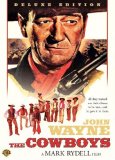| Reviews & Columns |
|
Reviews DVD TV on DVD Blu-ray 4K UHD International DVDs In Theaters Reviews by Studio Video Games Features Collector Series DVDs Easter Egg Database Interviews DVD Talk Radio Feature Articles Columns Anime Talk DVD Savant Horror DVDs The M.O.D. Squad Art House HD Talk Silent DVD
|
DVD Talk Forum |
|
|
| Resources |
|
DVD Price Search Customer Service #'s RCE Info Links |
|
Columns
|
|
|
Cowboys: Deluxe Edition, The
Sublime. A perfectly tempoed coming-of-age Western directed by talented Mark Rydell, The Cowboys is one of John Wayne's best 1970s Westerns; yet curiously, it's not a title that frequently comes up when the Duke's career highlights are discussed. As Mark Rydell tells it, John Wayne, after completing the film, told him that The Cowboys was his favorite film and best performance. It's not surprising he might express those sentiments to Rydell. Filled with exciting adventure, gentle humor, and most importantly, a moral worthy of the best Western fables, The Cowboys allows Wayne to give what might have been a fitting coda to his career (thankfully, he stuck around a little longer to complete six more films). It's another marvelous performance by the critically underrated Wayne, and lends The Cowboys an emotional gravity it would never have had, had Rydell not eventually relented on casting him in the part. Loaded with some fine extras, the The Cowboys: Deluxe Edition DVD features a terrific new transfer and a new booming 5.1 audio mix, making it required viewing for Wayne and Western fans, and a most welcome addition to John Wayne's ongoing 100th birthday celebration (May 26th).
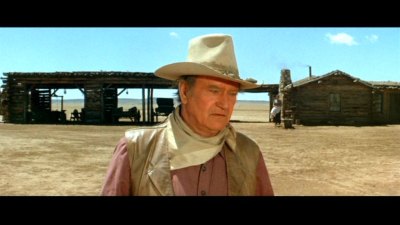
SPOILER ALERT
It's impossible to discuss the artistic merits of The Cowboys without revealing the ending of the film, so read no further if you haven't seen the film. John Wayne plays Wil Andersen, an aging rancher who's in a bind; gold fever has struck the county, and all his ranch hands have left right before they're to take 1,500 head of cattle on a 400 mile drive. Unable to find replacements, and unwilling to put his bills off onto credit, Andersen reluctantly tries the local one-room school house in hopes of finding some young cowpokes. But after observing the childish pranks of the children there, he gives up that idea, and returns home.
A few days later, he and his wife Annie (Sarah Cunningham) awake to the sounds of the school boys waiting outside, hoping to find employment. Encouraged by Annie, Wil gives the boys a test - riding a wild bronc for 10 seconds - figuring that none of them will stay on. But one by one, the plucky youngsters, none older than fifteen and more than a few quite younger than that, manage to hang on, impressing Wil. Out of options, he later agrees to let the boys ride along, as long as they know how difficult the journey is going to be. Further unsettling Wil (he prefers to ride with men he knows) is the substitute chuck wagon cook, Jedediah Nightlinger (Roscoe Lee Browne, in a terrific performance), a black man who Wil respects when he knows the recipe for apple pie, and when he demands more money than Wil's offering to pay. The unlikely group sets out on their cattle drive, full of unrealistic high spirits.
After the initial shock of the back-breaking work sinks in with the boys, the cattle drive turns into a rite of passage for the boys, who bond over their first surreptitious drunk together, and who learn from Wil's example that it is indeed a hard world where nothing comes easy or free. However, none of these physical hardships come close to the life-and-death danger posed by Asa Watts (Bruce Dern) and his gang. Initially trying to get jobs with Wil, Asa is found out in a lie and his services are rejected by the scornful Wil. Criminals newly out of jail, Asa and his gang secretly shadow the drive until they're found out by Dan (Nicolas Beauvy), a bespectacled young boy who Asa threatens with death if he spills the beans to Wil. When Jedediah falls behind with a broken wheel on the chuck wagon, Asa makes his move for the cattle, engaging Wil in vicious fight, mortally wounding him when he shoots Wil in the back. Wil hangs on long enough to tell Jedediah to get the boys back home, but the boys, now men after seeing their surrogate father gunned down in cold blood, have other plans, and set upon Asa and his gang with deadly force.
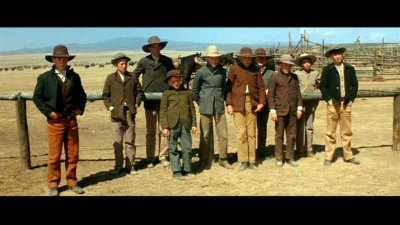
What's humorous about that critical viewpoint today is that it's largely based on a misreading of the film. Don't get me wrong, the main message of the film is that these young boys have learned valuable life lessons on the trail from the strong, righteous, and (largely missed by the critics) tolerant Wil Andersen, and when he's gunned down by a vicious, unremorseful, psychopathic killer, they understand precisely what needs to be done to him. There's no question this is the intent of the film. As director Mark Rydell, an avowed liberal filmmaker asserts in an added featurette to this DVD, this is an exciting adventure where young boys "get to play cowboys and shoot the bad guys" (he never really addresses the seeming contradiction of the film's message with his own political beliefs). What critics at the time missed is that this lesson of retributional justice wasn't imparted to the boys by Wayne's character. They learned it by themselves, despite Wayne's efforts to the contrary.
Throughout The Cowboys, Wil Andersen and Jedediah Nightlinger go out of their way to protect the boys from the harsher realities of adult life in the Old West. Noting the fact that he lost his own two boys ("They went bad on me"), Wil tries his best to be a caring, loving father figure to the boys. Naturally, he's not always successful (what parent is?), and he has to be reminded when his judgement fails (Jedediah telling him he was too hard on Dan when he's afraid to stand night watch). But for the most part, he worries about the boys, thinking that they may be rushing too fast towards adulthood (when he spies them enjoying their first drink). Jedediah shields the boys as well from the dangers of growing up too quickly (he asks the wagon load of prostitutes, led by Colleen Dewhurst, to move along because he knows he won't be able to keep the boys away). Critically, when the movie could have gone all wrong - when Wil discovers Asa tracking him and realizes that a fight is eminent - it's Wil who demands the boys act like boys again. He knows they've already matured into men; he tells them so. But he also knows that if he breaks out their weapons (all the boys were packing iron when they arrived; Will locked the guns up), some of the boys would invariably get killed in the firefight. It's Will who wants the boys to stay out of the fight, a decision that ultimately saves the boys and gets Wil killed. As well, once Wil's dead, Jedediah fights the boys who tie him up, demanding that they not go after Asa. He wants no part of their action, until he realizes they're going to go after Asa anyway, regardless of whether or not he helps them.
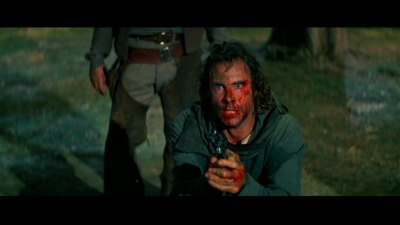
Quite correctly, the screenwriters (legendary writing team Irving Ravetch and Harriet Frank, Jr.) allow the boys to develop their own sense of justice. The two male authority figures wanted them to stay boys, to stay safe. The boys, now men, finally understand how random and cruel life really is, and how sympathy and compassion should be reserved for those who deserve it, like Wil. And dispassionate justice, in the truest sense (after all, this is the Old West - what were they going to do, call a cop?), should be meted out to the truly deserving, as well. Some critics also complained that the violence was unrealistic (they forgot that the boys brought their own guns, and that in those days, young boys learned how to shoot and hunt early), but what was Rydell to do, have some of the boys die at the end? The point of the fable in The Cowboys is the death of Wil, the death of the father figure, and the passage of the boys into manhood. Boys dropping like flies in the final confrontation would have been a cynical, faux-realistic ending that would have made a mockery of what proceeded it.
Wayne is particularly good here in The Cowboys. Looking alarmingly older and more ill than he did just three years prior in True Grit, and audibly short of breath, there's a subsequent vulnerability to his physical presence that transfers well to his characterization. There isn't that inevitable invulnerability to his role; we don't believe he can survive every dangerous encounter he comes upon. In fact, there's almost a feeling of dread when he goes to fight Dern; we're not sure he's going to come through it alive. That's a most unusual audience emotion in a John Wayne film.
Bruce Dern, who cornered the market on film crazies in the 1960s and 1970s, does a neat trick of being totally over-the-top in his villainy here, but with no corresponding audience delight resulting from that performance. He's a vicious, amoral killer in The Cowboys, but the audience doesn't applaud him (like say, Anthony Hopkins in The Silence of the Lambs). Dern, a most talented actor, truly pulls out the stops here (his physical assault of Dan, nearly drowning him in the river, is memorable - just watch the kid's face; he's really freaked out); he's certainly Wayne's most believable bad guy. The boys, some of them familiar from other films (I would imagine Robert Carradine and A. Martinez went on to be the most recognizable to audiences), are uniformly fine. Director Rydell, a former actor, admirably keeps the boys acting like real boys; there isn't a showy, actorly performance in the bunch. It's really a testament to his directorial sensitivity that Rydell, a former street kid from Brooklyn, was able to make such accomplished period pieces of Americana like The Cowboys and Steve McQueen's The Reivers.
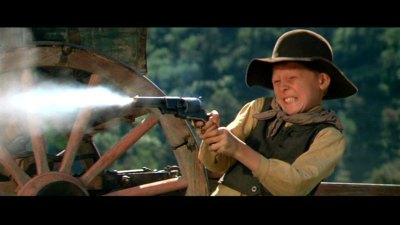
The DVD:
The Video:
Warner Bros. has come up with a much improved letterboxed widescreen, enhanced for 16x9 TVs, 2.35:1 transfer for The Cowboys: Deluxe Edition. Grain is almost non-existent, with colors much more balanced and true than the previous DVD release. Master cinematographer Robert Surtees came up with a visually stunning pallet of delicate shadings of browns and greens, and this new DVD transfer looks exactly the way I remember seeing the film back when it was in the theatres.
The Audio:
The addition of a new Dolby Digital English Surround 5.1 audio mix is a terrific bonus for this new The Cowboys: Deluxe Edition DVD. Giving full expression to composer John Williams' memorable score, the 5.1 adds quite a bit of dimension to the non-stop action scenes. Not used in its general theatrical release, but available on the previous DVD, the Overture, Intermission/Entre-Act, and Exit Music cues are re-inserted into the film. Although the music is amazing, and I never tire of hearing that theme, I think it was a good idea back in 1972 to take out that intermission. The film doesn't feel big enough for that interruption; in fact, it works against the mood of the piece, and proves to be a minor distraction. A French stereo track is also available, along with English and French subtitles. Close-captioning is also available.
The Extras:
Somebody at Warner Bros. obviously cared about this film, because there are some cool extras included in this The Cowboys: Deluxe Edition DVD. First, we have a totally invigorating commentary track by director Mark Rydell. Have you ever seen Rydell in Robert Altman's The Long Goodbye? Well, he's as funny here as he was in that. Frankly, I could listen to his commentary on films he didn't direct, too. Next, we have a 28 minute featurette, The Cowboys: Together Again, a newly shot reunion of sorts with just a few of the cast members of the film, including Dern, Lee Brown, and Rydell. It's a fun look back, with some great anecdotes about the Duke (I always find it amusing when self-described Hollywood liberals like Rydell and Lee Brown sound positively amazed that a conservative like Wayne could actually be nice, decent human being, as they constantly assert in mildly stunned tones). Next, we have the vintage featurette, The Breaking of Boys and the Making of Men, a eight and a half minute short from 1972 that's been run before on TCM. Next, we have the original trailer that clearly indicates the title of the film was originally John Wayne and The Cowboys prior to general release. And finally, we have a very cool set of 7" x 4" black and white original production stills, printed on glossy heavy cards, slipped into a waxed paper sleeve. It's a very surprising addition, and a most welcome one for big fans of the film.
Final Thoughts:
Containing one of John Wayne's most thoughtful, accomplished performances, The Cowboys is a beautifully realized coming-of-age Western with clear meditations on the difference between boys and men, between crime and moral fortitude, and between murder and justice. Director Mark Rydell shows an amazing sensitivity for the young actors' performances, as well as a sure-footed eye during the action sequences. Vividly entertaining, as well as quietly emotional and thought-provoking, The Cowboys stands simply as one of John Wayne's best Westerns -- and that's saying something. Containing quite a few extras, along with a stunning new transfer and 5.1 Surround audio mix, The Cowboys: Deluxe Edition is clearly highly recommended.
Paul Mavis is an internationally published film and television historian, a member of the Online Film Critics Society, and the author of The Espionage Filmography.


|
| Popular Reviews |
| Sponsored Links |
|
|
| Sponsored Links |
|
|
| Release List | Reviews | Shop | Newsletter | Forum | DVD Giveaways | Blu-Ray | Advertise |
|
Copyright 2024 DVDTalk.com All Rights Reserved. Legal Info, Privacy Policy, Terms of Use,
Manage Preferences,
Your Privacy Choices | |||||||









